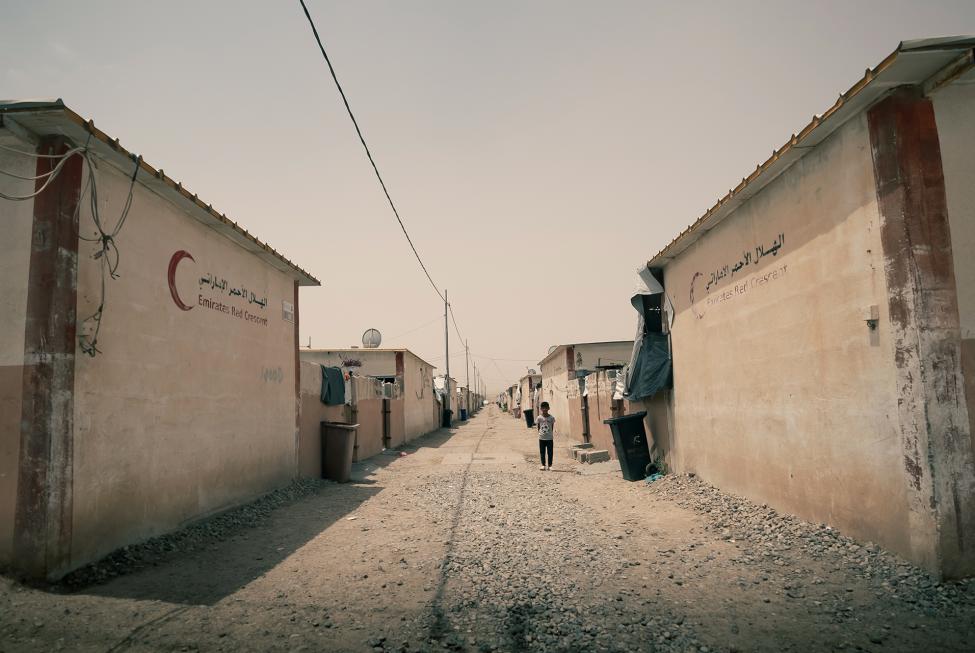-
من نحن
من نحنتعد المنظمة الدولية للهجرة جزءًا من منظومة الأمم المتحدة باعتبارها المنظمة الحكومية الدولية الرائدة التي تروج منذ عام 1951 للهجرة الإنسانية والمنظمة لصالح الجميع ، حيث تضم 175 دولة عضو وتتواجد في أكثر من 100 دولة. ان المنظمة الدولية للهجرة لها وجود في العراق منذ عام 2003.
معلومات عن
معلومات عن
المنظمة الدولية للهجرة في العالم
المنظمة الدولية للهجرة في العالم
-
عملنا
عملنابصفتها المنظمة الحكومية الدولية الرائدة التي تروج للهجرة الإنسانية والمنظمة منذ عام 1951 ، تلعب المنظمة الدولية للهجرة دورًا رئيسيًا في دعم تحقيق خطة عام 2030 من خلال مجالات التدخل المختلفة التي تربط بين المساعدة الإنسانية والتنمية المستدامة. في جميع أنحاء العراق ، تقدم المنظمة الدولية للهجرة استجابة شاملة للاحتياجات الإنسانية للمهاجرين والنازحين داخليًا والعائدين والمجتمعات المضيفة.
ماذا نفعل
ماذا نفعل
القضايا العالمية الشاملة
القضايا العالمية الشاملة
- البيانات والمصادر
- بادِر
- 2030 Agenda
It was shortly after sunset on an early April evening when Ahmed* paid a visit to his friend Saleh – just another evening for them in Debaga IDP camp. But when Ahmed extended his hand for a handshake, Saleh did not reciprocate. Ahmed was heartbroken, believing he was no longer welcome in Saleh’s home. What he did not know was that at that moment, Saleh simply could not move his arm – nor any other part of the entire right half of his body. Neither of them realized what was happening.
Ahmed soon understood that something was very wrong. He immediately took Saleh to the camp’s medical center, which is managed and supported by IOM Iraq’s medical team. Though the hour was late, the medical team on duty received Saleh and ran him through some tests.
“I could not move my hand at all. I was just sitting there looking at him,” Saleh said of the terrifying experience with Ahmed. “My lips, tongue, my right arm and leg were all numb. I couldn’t feel them. Even my breathing was difficult. My friend thought I was angry at him or that I did not want to see him anymore. I had no idea what was going on with me at that moment. And with much difficulty, I was trying to explain to him.”
A fifty-year-old father of six, Saleh and his family have been living in Debaga camp since 2015, when they were displaced from the town of Shirqat. Like many others, Saleh has not been able to return due to security reasons and a lack of basic support services in his area of origin.
“After the check-ups, the team realized that Saleh had had a transient ischemic attack (TIA),” explained Dr. Hiwa Muhammed Amin, Erbil Interim Medical Team Leader. “His blood pressure was 190 over 150, which is considered very high. He was given a shot to normalize his blood pressure immediately. Shortly after that, his condition was much better. He was advised to go to a hospital in Erbil right away to visit a specialist for immediate follow-up, and that IOM would support his transportation via ambulance.”
However, Saleh – who felt much better after the shot and whose body movements were back to normal – decided against taking the advice of the medical center. He went back home thinking everything was ok.
“But one hour later, it hit me again. I lost all body movement and the right side of my body felt numb. Thank God Ahmed was still there. He rushed me to the camp health center again, where they gave me another shot to bring down my blood pressure. This time I realized the risk. I have six kids and they are young and depend on me,” said Saleh, whose children range between six and fifteen years of age. “I chose to go to the hospital in Erbil. I was put in an ambulance and immediately transferred to a hospital in Erbil where they did checkups including a CT scan, and gave me medication.”
IOM Iraq works in close coordination with hospitals in Erbil to refer cases that require a higher level of specialized care.
The doctor at the hospital confirmed to Saleh that he had sustained a TIA and that if he had not immediately been given the shots at the Debaga medical center to bring down his blood pressure, it would have led to in a complete block of blood circulation to his brain, resulting in complete and permanent paralysis of the entire right side of his body.
The Debaga camp medical center is the main health care provider in the area – and the only one that provides emergency services 24 hours a day, services that the IDPs and host community can rely on for life-saving care.
The center provides primary health care services, chronic disease management and COVID-19 services, as well as emergency services such as ambulatory referrals. On average, the health center receives about 150 - 200 daily visits by patients, not only from among the 7,500 camp residents, but also from its surrounding villages.
At the height of its operations, when the camp had a population of 45,000 (between 2015 and 2018), the center managed a staggering 600 - 800 daily visits, with two stationary clinics and a mobile team.
Saleh is one of the many individuals whose lives have been saved through the continuous support of the medical center in Debaga camp. Indeed, thousands depend on the center for its life-saving services, and its continued functioning is crucial to protecting the lives of not only the camp’s IDPs, but also the lives of Debaga host community members and those living in the area’s surrounding villages.
The medical center in Debaga camp is able to provide this critical care thanks to the support of USAID’s Bureau for Humanitarian Assistance (BHA) and the Government of Germany.
*The name has been changed for privacy reasons.




